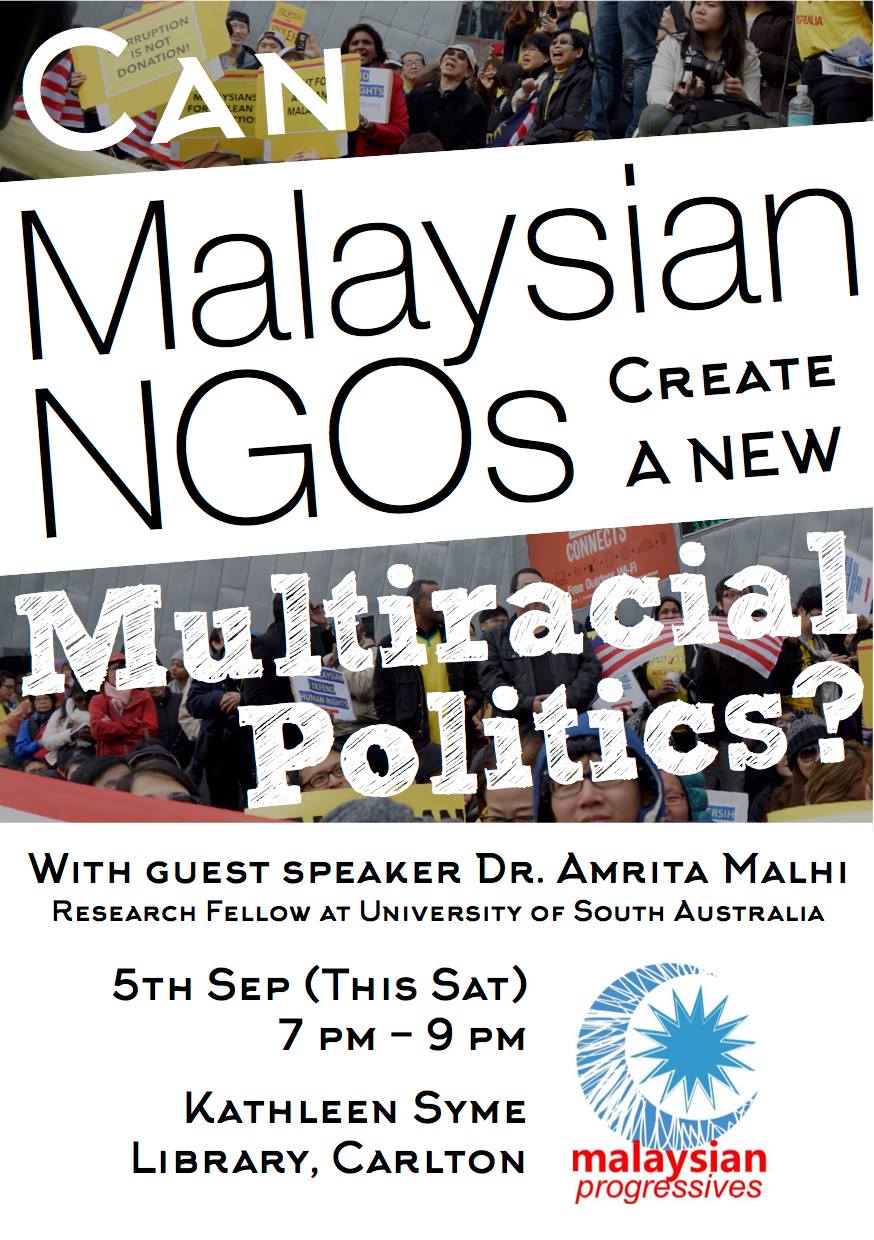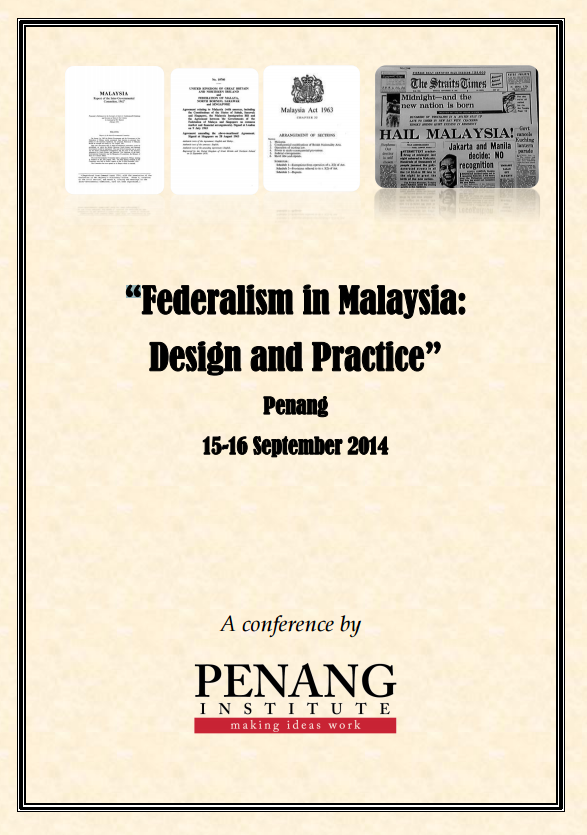Tonight I was interviewed by Beverley O’Connor on the 1MDB issue for the ABC TV current affairs program, The World. The interview focused on the 1MDB scandal, which continues to shape international perceptions of Malaysia.

Tonight I was interviewed by Beverley O’Connor on the 1MDB issue for the ABC TV current affairs program, The World. The interview focused on the 1MDB scandal, which continues to shape international perceptions of Malaysia.

Seminar Flyer, MPOz
Today, I gave a public talk at an evening lecture series organised by Malaysian Progressives in Australia. Why? Because they invited me!
Here’s the description:
With last Saturday and Hari Merdeka fresh in our memory, MPOZ presents “Can Malaysian NGOs Create A New Multiracial Politics?” where we explore and analyse the true impact of NGO movements like #Bersih4.
With us will be Dr Amrita Malhi, Research Fellow at the University of South Australia. Dr Amrita’s research is in South East Asian multiracial politics and for the purpose of this forum she will be sharing with us the history of Malaysians attempting to drive multiracial politics.
How much have Malaysians managed to integrate ourselves since our independence from the British? Can Malaysians, independent of political parties, create multiracial politics?
See you for some stimulating Saturday sembang-sembang!

I went along to the Bersih rally in Adelaide, where I got this shot of South Australian Senator Nick Xenophon working a megaphone before the crowd. Picture: Amrita Malhi

Malaysia’s Prime Minister Najib Razak arrives at a presentation for government interns at the Prime Minster’s office in Putrajaya, Malaysia, July 8, 2015. Picture: REUTERS/Olivia Harris
Today, I published an op-ed on The Conversation, focused on making sense of the 1MDB scandal in Malaysia.
Malaysia in turmoil as PM focuses on survival
A serious political crisis is playing out in Malaysia, with no certainty as to when, or whether, it will be resolved. At the heart of this crisis is Prime Minister Najib Razak, who recently shut down an investigation into his financial affairs by the Malaysian Anti-Corruption Commission (MACC).
The investigation had been triggered by allegations in the Wall Street Journal that RM 2.6 billion (US$700 million) had been transferred to Najib’s personal accounts from companies linked to 1Malaysia Development Berhad (1MDB). 1MDB is a state-owned strategic development company that is reportedly RM42 billion (US$11 billion) in debt.

Muslims praying before breaking their Ramadan fast. Stock image selected by the Malay Mail Online. Picture: REUTERS.
My recent op-ed piece in The Conversation was reported in Malaysia today by the Malay Mail Online. In keeping with the Malay Mail‘s interest in Malaysian national affairs, including international assessments of the nation’s political life, it focused on examples I gave to illustrate my point that Muslims themselves debate their own texts. This is an important point in the context of a broader debate around how we should understand Muslim politics, both in Australia and elsewhere, including our close neighbour and important trading partner, Malaysia.
For this reason, I chose examples which demonstrate that there are considerable differences in how Malay Muslims interpret Qur’anic quotes, the way in which these quotes are deployed is shaped by intense political competition in Malaysia. The full text is below, with a link at the end.
Rise in Islamic fundamentalism seen as result of administration unsure of majority support
KUALA LUMPUR, Oct 30 — Growing Islamic fundamentalism in Malaysia reflects an attempt by the ruling administration to reassert moral and political control after a divisive general elections, a political observer from the University of South Australia (UniSA) noted today.
According to an article in independent Australia-based news site The Conversation, the recent spate of enforcement by Islamic authorities may seem “comical”, but it points to an administration unsure of majority support.
“Yet political liberals may not understand that they reflect the Malaysian state’s overriding purpose now: to regenerate Malay Muslim majoritarianism, against strong counter-currents,” wrote Amrita Malhi, a research fellow with UniSA’s International Centre for Muslim and non-Muslim Understanding. Read more

Today, I was interviewed by Stan Grant in the Sky News Studios in Melbourne for the evening current affairs program, Reporting LIVE with Stan Grant. This interview mostly focused on how we should understand Muslim movements and Islamist politics: my argument was that texts alone are not enough, we have to also pay close attention to political and social contexts. Picture: Sky News.

Malaysian Opposition leader Anwar Ibrahim speaks in front of his supporters, during a gathering in Petaling Jaya, near Kuala Lumpur, Malaysia, late 27 October 2014. EPA/AZHAR RAHIM
Today, in response to an article in Quadrant by Australian anthropologist Prof. Clive Kessler, I published an op-ed onThe Conversation in which I argue against a textual approach to understanding “Muslim” politics. The full text is below.
Malaysia reaches a critical crossroad over state Islamisation
Fuelled by the rise of Islamic State (IS) in Iraq and Syria, debate about Islam and violence has flared again in Australia. In a predictable cycle of provocation and reaction, governments launch a wide-ranging security response while denying claims that Muslims are scapegoats. At the same time, they must reassure non-Muslims that the suburbs are safe.
The result is government statements that aim to placate everyone: Muslims are not targets and non-Muslims should stay calm because, as they argue, Islam is foremost a “religion of peace”.
Interpreting texts is problematic
In recent weeks, Australian Attorney-General George Brandis has utteredprecisely these words. A battery of spokespeople for the Muslim community has chimed in. This is not rocket science: this gesture of reassurance is aimed at maintaining relationships, calming the angry and managing constituencies. Read more

Federalism workshop flyer, issued by the Penang Institute.
I’ve just participated in a workshop convened to consider whether it might be possible to innovate the way Malaysian federalism functions, both in theory and in practice. As the present system is a highly centralised federation, it seems this question is increasingly important to state governments wishing to test their position in relation to federal power since the “political tsunami” elections of 2008 and 2013. Read more

ASAA 2014 Conference Brochure Cover
The 20th Biennial Conference of the Asian Studies Association of Australia just wound up today in Perth. It was a great experience, and featured keynote presentations by South Korean Ambassador for National Security Affairs and Professor of International Relations Prof. Chung Min Lee, and Race Discrimination Commissioner, Tim Soutphommasane.
My own talk was on how much Malaysia’s 2013 election highlighted the tensions present in Malaysian society over what sort of nation it should be, and whether or not it needs its “National Front” to hold itself together firmly enough to prevent this tension from undoing it completely. This kind of analysis needs a bit of distance from the election, however.

Stock image of a MAS plane selected by Asian Currents
Today, Asian Currents published an op-ed I wrote on the Malaysian authorities’ behaviour in relation to MH370, and the relationship between this behaviour and the wider issue of public trust in the authorities after the contested 2013 election result. The full text is below.
Missing aircraft flies into the turbulence of Malaysian politics
BY Amrita Malhi
The disappearance of Malaysian Airlines flight MH370, writes AMRITA Malhi, has become enmired in Malaysian politics.
On Saturday 8 March, Malaysian Airlines flight MH370 disappeared.
The same weekend that the aircraft was reported missing, MP and opposition leader for the People’s Alliance coalition, Anwar Ibrahim, was sentenced to a second prison term for sodomy by the Court of Appeal. Anwar’s defence lawyer, fellow People’s Alliance MP Karpal Singh, was handed down a fine for sedition.